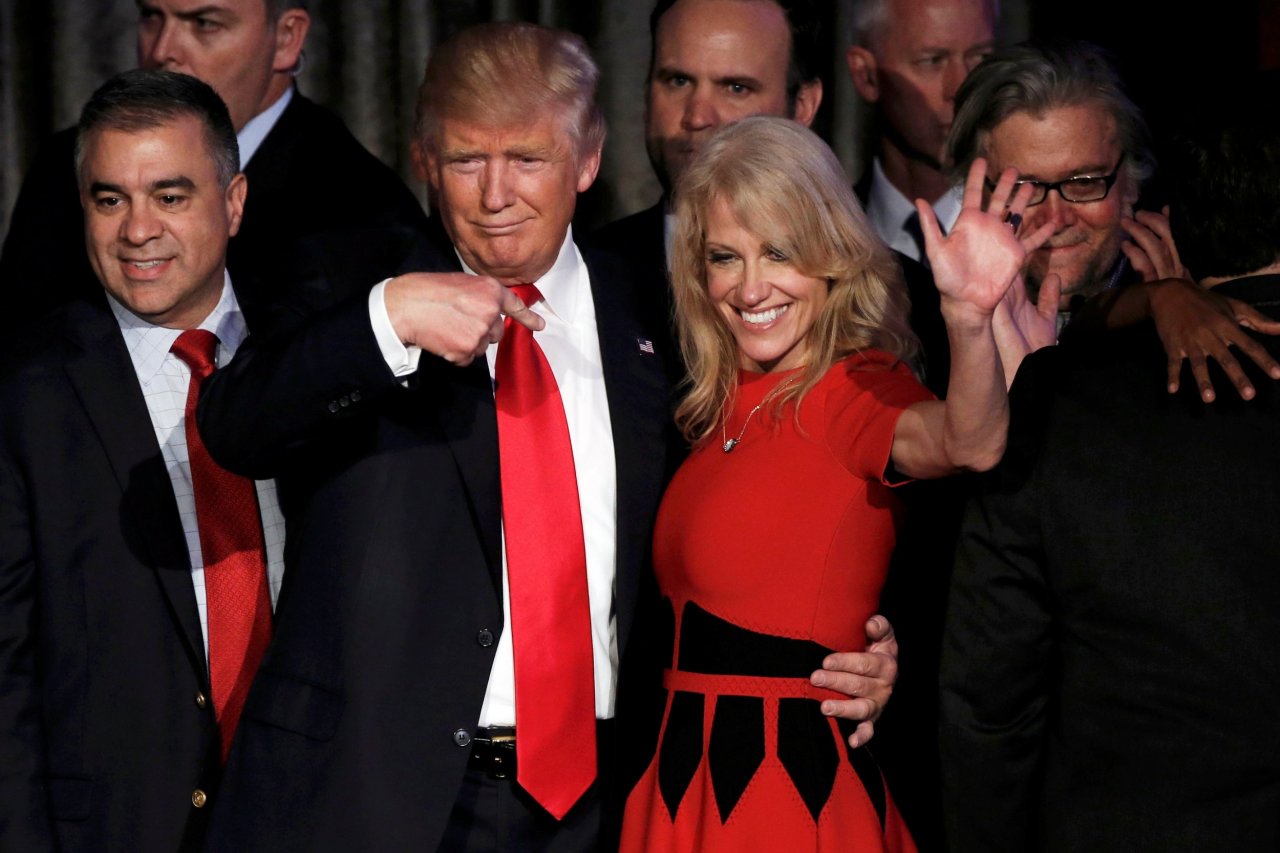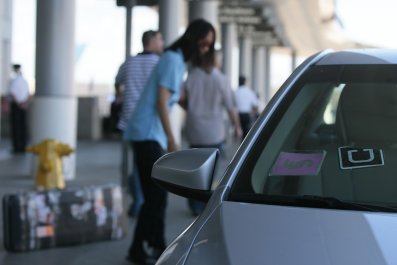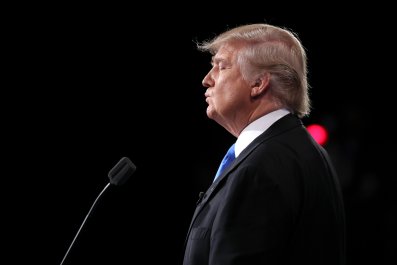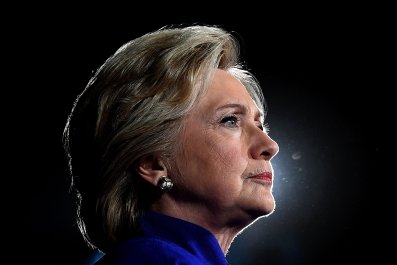As evening fell on November 6, just two days before what is arguably the most stunning political upset in American history, construction worker Jonathan Langford patiently waited in a line that stretched for more than half a mile. The 32-year-old and nearly 10,000 other Pennsylvanians would wait in that line for four hours before they filed into a huge airline hanger in suburban Pittsburgh for a Donald Trump rally. Langford—and the rest of the crowd—would wait for nearly two more hours before Trump finally arrived, and would do so without complaint. "I've never been to a rally for someone who is going to be president. This is a little bit of history here. He's going to win."
The polls didn't say so (though they were getting tighter). Most of the pundits didn't believe it. And, truth be told, even some of the top people in the Trump campaign, just a few days before the election, doubted it would happen. "We may run out of time," a senior adviser said just days before the election. But polls don't necessarily capture commitment, they don't capture intensity, and they surely didn't capture the simmering anger in large swathes of the American electorate.
From the moment he descended the escalator at Trump Tower in the summer of 2015 to announce his improbable candidacy, Donald J. Trump surfed that anger. The 70-year-old political neophyte—a blunt, sometimes coarse New York real estate developer turned reality TV star—became the champion of those Americans fed up with what construction worker Langford called the "connected class. The Washington types, Republican or Democrat, who don't seem to give a damn about people like me. It's like we had no voice before Donald ran. No one heard us."
Now they have—loud and clear. Trump's narrow victory on November 8, and the Republican Party's retention of both houses of Congress, gives the GOP full control of the U.S government. But at this extraordinary moment in American political history, that doesn't necessarily mean what it did in previous years. Trump's victory was a defeat of the Washington establishment, both Democrat and Republican. The speaker of the House, Paul Ryan, had tepidly endorsed the candidate, condemned Trump's criticism of a Mexican-American judge as "the very definition of racism" and seemed pained at times to even speak the candidate's name. Senate Majority Leader Mitch McConnell focused on Senate races and rarely commented on the GOP's nominee.
The reason for that is clear. As that rarest of species, a Republican who's a senior executive in Hollywood, put it late Tuesday night, "Trump's win means the GOP now stands for 'Gone Old Party.'" Indeed, Ryan, waking up Wednesday morning, might well be asking himself a vexing question: What the hell do I do now?
Ryan was Mitt Romney's running mate four years ago—that's the Romney who refused to endorse Trump. Ryan is not only speaker of the House but also one of the GOP's foremost policy wonks, having pushed an agenda centered on tax and entitlement reform. Like most establishment Republicans, he also favors free trade and robust American engagement abroad, and he has never been a hawk on immigration.
Until November 7, 2016, Ryan's positions on issues were broadly representative of what had been mainstream GOP thinking. Had been, that is, until the Trump takeover of the party and the White House on November 8. The political fracture within the GOP is already obvious. According to the last New York Times/CBS News poll before the election, only 39 percent of Republican respondents said Trump has been good for the party, while 41 percent said he's been bad. (The remaining 16 percent, evidently vacationing on the planet Pluto, said Trump's 2016 run "hasn't had much of an effect" on the GOP.)
When Trump, in his victory speech just before 3 a.m. on November 9, said to those who didn't support him, "I'm reaching out to you for your guidance and help so we can work together and unify our great country," he was presumably talking to the 54 million Americans, most of them Democrats, who voted for Hillary Clinton. But it applied to a fair number of establishment Republicans—the Romneys, the Bushes, the Never Trumpers of the conservative pundit class. Because Donald Trump's core supporters, the white working-class voters who propelled him to the nomination, don't (to put it mildly) share much of the Republican establishment's world view. A big chunk of them are not for free trade, and they are stridently against illegal immigration. ("Build that wall" was a standard chant at every Trump rally.) During the campaign, Trump even expressed skepticism about the need to rein in entitlement spending, something that "made House Republicans' heads spin," said a staffer on the House Ways and Means Committee.
Trump's base is also, like Trump himself, deeply suspicious of American engagement abroad. He ran to the left of Clinton on foreign policy. He has questioned what the U.S. gets out of core alliances—with NATO, with Japan, with South Korea. While Clinton said she'd implement a no-fly zone in Syria to try to stop the butchery of President Bashar al-Assad—despite the presence of Russian air power in support of Assad—Trump wondered aloud why we're not joining with Russia to fight the Islamic State (ISIS). He has similarly expressed skepticism about the need to deter China in the South China Sea, at one point telling an interviewer, "You know, that's a long way over there. The last time I went to China it took me like 18 hours to get there, so I don't know."
Trump—campaign Trump, anyway—ran as nothing less than a neo-isolationist. Will he now be captured by the internationalist GOP establishment or force them to bend to his will? A senior Republican emailed Newsweek once it became clear Trump was going to win on election night, saying, "The Pentagon is in almost as much shock as the Democrats right now." The same source said, "Reality's going to intrude on Donald in a hurry. The isolationist stuff can't last."
As stunning as it was, this was not the type of wave election that propelled Ronald Reagan to the presidency in 1980. Reagan won big in both the electoral college and the popular vote. Trump, by upsetting Clinton in key industrial states—Pennsylvania, Michigan and Wisconsin—won with a little room to spare in the electoral college but as of early Wednesday morning the popular vote was close to a dead heat, and it seemed possible Clinton might win more overall votes nationwide. Democrats, in the course of the campaign, convinced themselves that Trump is a monster: an uninformed, sexist boob, a demagogue who shouldn't be anywhere near the nuclear codes. It is hard to imagine them responding warmly to Trump's post-election entreaties to work together, at least not anytime soon.
But in policy terms, there should be room for some bipartisan cooperation—something that many Americans are dying to see. Part of the disgust with Washington so obviously evinced by this election is the absolute lack of bipartisanship on pretty much anything. But the left is ascendant now in the Democratic Party in the wake of Clinton's shocking loss. And at least part of the left could probably warm to Trump's desire for a massive infrastructure build-out to create jobs (though the environmental wing of the party will fight that). The left also forced her to abandon her previous support for the so-called Trans Pacific Partnership, a free-trade deal Trump wants no part of either.
The question, of course, is whether those two planks of "Trumponomics"—the third is corporate and personal income tax reform, which many Democrats will likely oppose—are actually good policy. Trump's election may well be the death knell for a core tenet of U.S. policy—no matter who was president—in the post-war era: promoting an ever-expanding open international trading system. That indeed has been central to America's influence in the world, as much a part of the country's position as a superpower as its nuclear arsenal. Not surprisingly, Wall Street's initial reaction to Trump's election was ominous: As it became clearer and clearer on election night that he would win, Dow futures plunged more than 700 points.
The central question that now swirls around the president-elect—the first businessman ever elected without political or military experience—is thus straightforward: Is the Trump we saw on the campaign trail going to be the Trump who governs? Is he really going risk a trade war with China by slapping a 35 percent tariff on its exports? What if that triggers a stock market sell-off that makes the election eve futures meltdown look like a picnic? How can he promise a massive infrastructure build-out, a spike in defense spending and the status quo on entitlements without adding massively to already massive deficits?
The Washington insiders who Trump beat say he can't and he won't. But Trump knows well who elected him, and on trade and infrastructure in particular, the lunch bucket working-class voters in western Pennsylvania and eastern Ohio, in Michigan and Wisconsin, want Trump to deliver. Failure to do so would be a betrayal.
Trump, famously, wrote a best-selling book titled The Art of the Deal. Deal-making—and boasting about his prowess at deal-making—is part of what made Trump Trump. Now, as he descends upon a shell-shocked Washington—with Democrats sure to be fierce in opposition and many Republicans skeptical at best—that ability will be tested as never before. The United States has decided to take the risk that Donald Trump is who he says he is. That he can "make America great again." By winning the presidency, he confounded his many skeptics. Over the next four years, he needs to do it again.



















